Enhanced TDS
Identification & Functionality
- Additives Included
- Blend
- Yes
- Chemical Family
- Country of Origin
- Function
- Resin
- Plastics & Elastomers Functions
- Polymer Name
- Product Code
- MITM14915
- Single Ingredient
- No
- Technologies
- Product Families
Features & Benefits
- Labeling Claims
- Materials Features
Applications & Uses
- Plastics & Elastomers Processing Methods
- Processing Information
Injection Molding
- Typical melt temperature (Min / Recommended / Max) : 210°C / 230°C / 280°C.
- Mold temperature : 20 - 60°C
- Drying time and temperature (only necessary for bags opened for more than two hours) : 4-6 hours at 80-90°C.
Properties
Technical Details & Test Data
- Technical Data
Viscosity-shear Rate
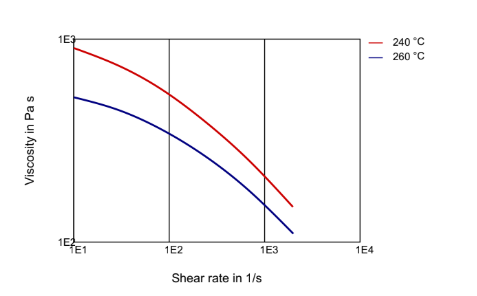
Shearstress-shear Rate
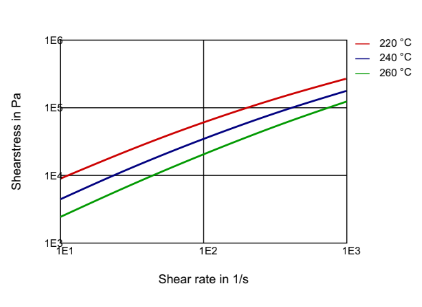
Dynamic Shear Modulus-temperature
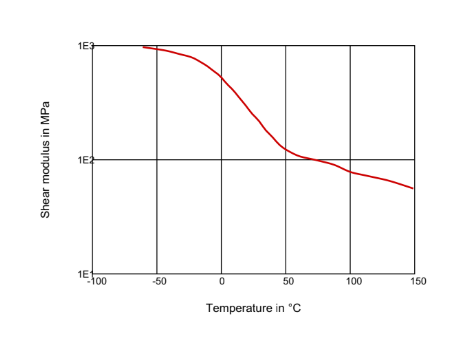
Stress-strain (Isochronous) 23°C
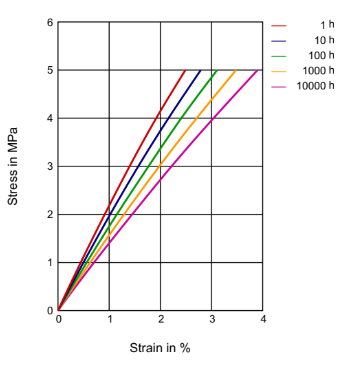
Creep Modulus-time 23°C
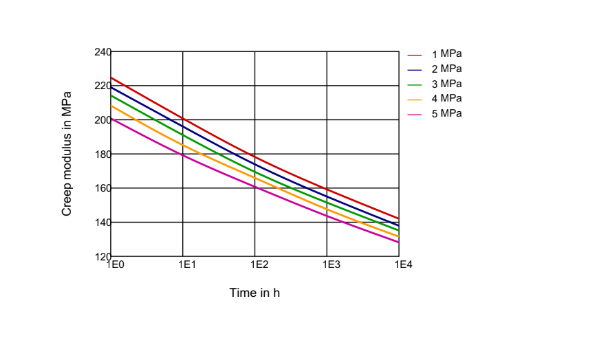
Packaging & Availability
- Packaging Type
Principal Information
- Group Principal Number
- S000003
- Principal
Other
- Color (SDS)
- Translucent
- Insoluble in (SDS)
- Water
- Item Number
- Other Hazards
- Processing may release vapors and/or fumes which cause eye, skin and respiratory tract irritation, Prolonged or repeated exposure may cause: headache, drowsiness, nausea, weakness, (severity of effects depends on extent of exposure).
- Temperature Control
- Yes
- USA/DOT UN Number
- Not Applicable
- Electrical Properties
Value Units Test Method / Conditions Comparative Tracking Index 600.0 - IEC 60112 condensed Dielectric Constant 10.0 - IEC 60250 at 100 Hz, dry Dielectric Constant 4.0 - IEC 60250 at 1MHz, dry Dielectric Strength 23.0 kV/mm kV/mm IEC 60243-1 condensed Dissipation Factor 0.0964 tan δ tan δ IEC 60250 100Hz, dry Surface Resistance 500000000000.0 Ω Ω IEC 60093 condensed Volume Resistivity 1000000000.0 Ω-cm Ω-cm IEC 60093 condensed - Mechanical Properties
Value Units Test Method / Conditions Charpy Impact Strength 6.0 kJ/m² kJ/m² ISO 179-1EA at -30°C, condensed, notched Hardness 58.0 Shore D Shore D condensed Hardness 58.0 Shore A Shore A ISO 868 condensed Nominal Strain at Break min. 50.0 % % ISO 527-1 condensed, at break, nominal Nominal Strain at Break min. 50.0 % % ISO 527-2 condensed, nominal Strain at Yield 42.0 % % ISO 527-1 condensed Strain at Yield 42.0 % % ISO 527-2 condensed Tensile Modulus 345.0 MPa MPa ISO 527-1 condensed Tensile Modulus 345.0 MPa MPa ISO 527-2 condensed Weld Load 2.16 kg kg ISO 1133 at 235°C - Physical Properties
Value Units Test Method / Conditions Density 1050.0 kg/m³ kg/m³ ISO 1183 condensed Density 1050.0 kg/m³ kg/m³ ISO 1183 dry basis Load/Unload Temperature 130.0 °C °C ISO 75-1 at 0.45 MPa, dry, deflection under load Load/Unload Temperature 45.0 °C °C ISO 75-1 at 1.80 MPa, dry, deflection under load Load/Unload Temperature 130.0 °C °C ISO 75-2 at 0.45 MPa, dry, deflection under load Load/Unload Temperature 45.0 °C °C ISO 75-2 at 1.80 MPa, dry, deflection under load Melt Volume-Flow Rate 35.0 cm³/10 min cm³/10 min ISO 1133 at 235°C Melting Point 181.0 °C °C ISO 11357-3 at 10°C/min Melting Point 181.0 °C °C ISO 11357-1 at 10°C/min Mold Shrinkage 1.0 % % ISO 2577 normal, dry Mold Shrinkage 1.2 % % ISO 2577 parallel, dry Mold Shrinkage 1.0 % % ISO 294-4 normal, dry Mold Shrinkage 1.2 % % ISO 294-4 parallel, dry Softening Point 140.0 °C °C ISO 306 at 50°C/h, 50N, dry Storage Temperature max. 140.0 °F °F Water Absorption 1.6 % % ISO 62 dry basis - SDS Physical and Chemical Properties
Value Units Test Method / Conditions Autoignition Temperature (SDS) 788.0-842.0 °F °F Bulk Density (SDS) 570.0-670.0 kg/m³ kg/m³ Decomposition Temperature (SDS) min. 662.0 °F °F Density (SDS) 1.03 g/cm³ g/cm³ Lower Explosion Limit (SDS) 88.0 % % at 85⁰C Melting Point (SDS) 372.0 °F °F - Shelf Life & Stability
Value Units Test Method / Conditions Shelf Life 2.0 yr yr - Thermal Properties
Value Units Test Method / Conditions Coefficient of Thermal Expansion 0.00011 /K /K ISO 11359-1 dry, parallel Coefficient of Thermal Expansion 0.00011 /K /K ISO 11359-2 parallel, dry
